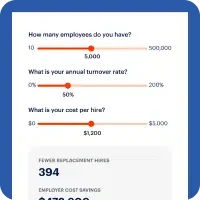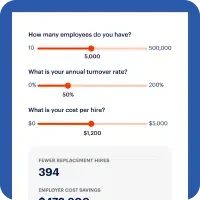Employee retention is a company’s ability to keep its employees year over year. Retention rate is calculated similarly to turnover rate, as a percentage by dividing the number of employees with one or more years of service by the number of people in those positions one year ago.
In the retail sector, employee retention is crucial for a number of reasons.
Consistency and Customer Service: Retail staff members that have worked for a firm for a longer time tend to be more knowledgeable about its processes, goods and services. Over time, they gain experience and product knowledge, which enables them to deliver more efficient and customized client support. A pleasant customer experience is facilitated by consistent and knowledgeable staff, which raises customer satisfaction, repeat business and loyalty.
Cost Savings: Businesses in the retail industry may incur high costs as a result of high employee turnover. It takes time, effort, and money to hire and train new personnel. Retailers can cut their costs associated with hiring, onboarding and training by concentrating on employee retention.
What is the Retail Retention Rate
According to McKinsey, America’s retail industry comprises 20% of all American employees.1 That’s 31 million people – about 9 million more people than the next two largest industries.2 Employing such a large population of the American workforce, the retail industry is essential to the health of America’s economy and society.
What happens in retail is felt by the entire country in the form of price increases, shipping delays, poor customer service and more. When retention in the retail industry drops, problems increase for businesses and shoppers alike.
There are many reasons for retail’s low retention rate, including high competition, lack of difficulty to leave, low wages, lack of development, poor employee recognition and more. Retail employees have a lot of choices with employers constantly hiring and always in need of employees.
4 Effective Strategies for Retaining Employees
1. Invest To Build Strong Managers and a Development Culture
According to McKinsey, one of the top reasons why retail employees leave their jobs is because of a lack of career development. A lot of retail employees are early in their career and look at their job as a stepping stone.
On top of that, a lot of managers who are supposed to be mentoring younger employees are also likely to leave. Managers in the retail industry are 1.75 times more likely to leave their job than non managers.3 If companies want to create a work culture where employees feel supported in their career development, then it would suit employers to invest in a development culture that supports managers and non managers.
2. Improve Experience for Workers To Avoid Repetitive Work
The world is becoming more and more digital and that opens doors for retail employers to innovate and create engaging experiences to prevent employees from getting burnt out or bored. When retail employees are doing boring, repetitive work that they don’t feel is meaningful, it causes a lack of connection with the company, prompting employees to leave.
Leading retailers are utilizing technology to automate tedious and repetitive tasks so employees have more time to do the meaningful work they care about.
It’s imperative that employers spend time auditing and analyzing the workload of frontline retail employees so they can assess what is mundane, what can be automated or simplified and what can be removed to free up space for employees to engage with work that motivates and inspires them.
3. Improve the Pay Experience
One of the top reasons why retail employees leave is because of poor compensation, which doesn’t necessarily mean a low salary, but instead means a compensation package that doesn’t support their individual needs. Pay alone is not enough to retain today’s top employees.
Employees want pay structures that cater to their needs and allow them to live their life to the fullest. One of the top benefits employers are using to accomplish this is on-demand pay.
4. Innovate To Create Flexibility at Work Promoting Work/Life Balance
The global workforce has been upended due to the Covid-19 pandemic, and one of the biggest changes to happen across the world is work flexibility.
Office employees have reaped many benefits of work flexibility due to pandemic measures, but retail workers haven’t experienced the same changes. Frontline retail workers are still expected to show up in person for a full week of work.
Employers need to innovate and figure out how to offer their employees the type of flexibility most of the global workforce is experiencing today.
Encouraging a balance between work and personal life is crucial for lowering employee burnout and turnover. Retailers can introduce flexible scheduling choices, provide paid time off, and, when possible, offer consistent and predictable work hours. Retailers can establish a happy and encouraging work environment by addressing the personal needs of their staff members and encouraging a healthy work-life balance.
Put Your Employees First
With the world becoming more and more digital and customer expectations becoming more and more demanding, the retention rate in the retail industry is expected to be a major issue that employers need to address in order to succeed.
Today’s leading employers will succeed by putting their employees first by investing in their career development, improving their work experience, improving their pay experience and innovating to create flexibility at work.
Discover how on-demand pay can make a difference in retail employee retention. Book a demo today.
1 Mckinsey & Company, 2022:DailyPay, 2020
2 Mckinsey & Company, 2022:DailyPay, 2020
3 Mckinsey & Company, 2022:DailyPay, 2020













